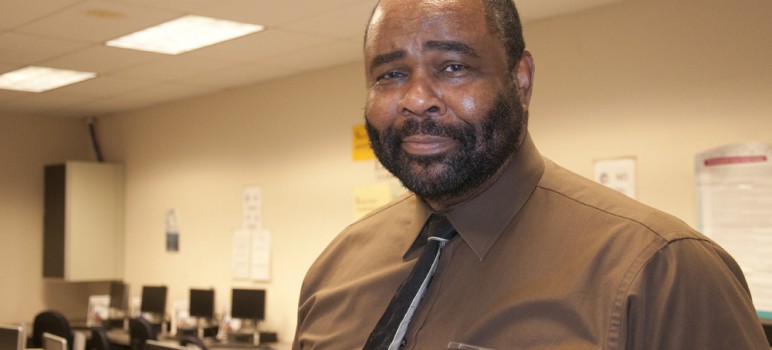Growing up in inner-city Detroit, Edward Youngblood struggled in school. Many of his teachers scolded him for not following instructions.
“Time tables,” the Silver Creek High School teacher says sternly, leaning over an empty table in the center of his business classroom. “We had to memorize them. But I start them differently. I always multiply by 10 first, so my teachers told me I couldn’t do it the right way. They told me something was wrong with me.”
Luckily for Youngblood, a conversation with a school-assigned mentor helped him realize that there is no ‘right’ way to think. While working on a homework assignment together, his mentor told him his learning style was different, but that was okay.
“He said I only need to understand how I think to be successful,” Youngblood recalls. “I stopped listening to the external and started listening to my own voice, and that enabled me to excel.”
Youngblood has carried that philosophy into his career, first in the business world and today as a business and accounting teacher. “I try to show my students how to learn,” he says. “If you don’t understand it, you haven’t learned it. You can repeat or memorize, but you have to be able to use it.”
Building a syllabus with practical relevance came naturally to Youngblood, who, over the course of 17 years worked as a project manager for IBM, co-founded an e-commerce company during the dot-com boom and consulted with companies such as Intel and Cisco before catching the teaching bug.
Between opportunities, a friend asked him for a favor—to work as a substitute teacher for communications classes in the East Side Union High School District. What started as a temporary eight-week assignment turned into a calling.
“[Teaching] was love at first sight,” he says. “Kids don’t know what they need. They feel like they’re forced to learn, but I brought some real-world experience into the classroom, and because of that my credibility mushroomed. I delivered content and the real-world applications. I could teach them how to do something and be successful.”
Hinging his instruction on project-based learning, Youngblood pushes his students to be independent, critical thinkers. Class activities include market research for invented candy bars and “Pizza Pizzazz,” a project requiring students to survey prospective consumers on preferred pizza toppings.
The skills he helps students build in class, such as asking the right questions to get the right answers, transfer to decision making in all aspects of life.
“I don’t believe, and never will, that we need to fill our kids’ heads with a bunch of theory and no application,” he says. “That’s just data.” Student motivation, he adds, soars when teachers relate coursework to their current and future needs.
Beyond creating a learning environment full of purpose, Youngblood sets high expectations and invests his time to create strong relationships. He signs contracts with his students and parents the first day of school, affirming their joint commitment to learning. He calls each of his students’ families, 134 of them this year, at least three times.
During the first call Youngblood introduces himself and thanks them for letting him teach their children. The second call provides updates on progress. The final call offers end-of-year praise. It’s a task he calls easy; one that he would do more frequently if he wasn’t traveling so much. The 10-year teacher volunteers for more than 20 education-related organizations.
Throughout the year, Youngblood coaches his students at business competitions across the state and country, traveling as far as New York for the Network for Teaching Entrepreneurship’s national finals. His students have qualified for the prestigious competition six times, bringing home a national championship once, two second-place awards and two third-place showings, which he says is more than any other school in the country.
In addition to his proven success in helping students succeed in and out of the classroom, Youngblood also serves in a number of important roles with statewide organizations, such as the California Department of Education, the California Business Educators Association and the California Teacher’s Association. His commitment is unwavering.
“I want to give back,” he says, after finishing a school site council meeting late on a Tuesday night. “Learning is sharing and that’s my purpose in life.”
Youngblood’s eagerness to collaborate keeps his teaching sharp, and it helps him maintain those real-world connections he finds so important.
“I know that my kids can communicate, that they know how to stand up for themselves, how to express an idea, and that they know a lot about business,” he says.
As successful as he has been in past professions and now as a teacher, he knows his current work is grounded in love.
“I see [education] as a ministry,” he says. “We need to prepare our kids for this thing called life with a lot of ups and downs, trials and tribulations. These kids are our future. When we prepare them for their future, we are preparing them for our future.
“I can’t teach without loving it. There is no education without love.”
The East Side Teachers Association sponsored this post. See more stories about Amazing Teachers.

